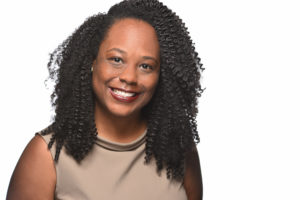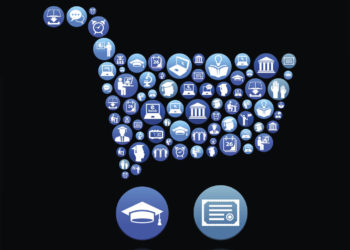
Editor’s Note: Today’s Guest Post is written by Jasmine Wallace, the Peer Review Manager at the American Society for Microbiology (ASM) in Washington, D.C. At ASM she sets peer review priorities and helps ensure peer review practices and policies are up-to-date and applied consistently across their journals. She has a master’s degree in Publishing from George Washington University, and serves as a member of the Professional Development Committee for the Council of Science Editors.
I recently came across a Scholarly Kitchen post in which Ann Michael posed the question of the month, asking the Chefs, “What is the value of a Master’s in Publishing?” Having received my master’s a few years prior and valuing the connections, experience and knowledge attained; I was very interested in seeing just what the Chefs had to say. As I read through the post I began to shrivel at the responses (yes, shrink into a small ball).
All but two of the Chefs took similar perspectives: An individual with a master’s degree might have an advantage in getting a job, but ultimately, a Master’s in Publishing wasn’t particularly useful for career progression.
Thankfully, there were some guest contributors who did not share this view point, one of which was my professor in grad school (shout out to Barbara Meyers Ford!), and were eager to share what they found most valuable about the degree. At the time, I would not have had the guts to speak up about this topic (even to make a comment). However, as there has been a call to action for more Kitchen readers to find our voice, I want nothing more than to share my experience.

I find a Master’s in Publishing to be not only valuable to the individual, but also crucial to the success of our industry. Historically, publishing may have been viewed as a trade profession, one which individuals learn by way of apprentice-style scholarship; but, should we continue to call publishing a trade profession? Do we pass down learning from teacher to apprentice? No, not anymore; and it’s fair to say there have not been apprenticeships in decades.
The absence of such programs is one reason master’s programs even began to surface in our industry. Perhaps, this is also why we are not able to keep up with the world around us as quickly and nimbly as other non-trade professions.
There is a constant conversation centering on technology-driven initiatives that our industry was not expecting. External investors are infiltrating the publishing world in droves and causing very big disruptions, and in some dire cases publishers were not able to adjust quickly enough and crumble.
As I worked to finish my program, the degree became not just about career progression, but also a direct path to a competitive advantage and a stepping stone ahead in an industry built on networking and reputation.
While I understand that we are in an environment that is constantly shifting, and that it is difficult to develop an academic program that continuously evolves to meet our growing and undetermined needs, it is not impossible. If just a few more experts shifted their primary focus to helping develop these graduate programs then our industry would begin to see the benefits and value of having early career driven and invested professionals.
Initially, I sought a graduate education to help with my career because I was not able to find a way up the publishing ladder. I had been working in the field for almost 5 years, mostly in entry-level positions and had decided that I wanted to further commit to publishing as a career. I had no idea how or where to really get started on a path to leadership. And if not knowing how to begin wasn’t enough, my problem was compounded by the lack of diversity in our industry, so I had even fewer examples of what my career could realistically look like.
Frustrated at times but determined to find a real entry point into the field, I applied for mentor programs, attended conferences, and became a member of as many professional organizations as possible.
As I worked to finish my program, the degree became not just about career progression, but also a direct path to a competitive advantage and a stepping stone ahead in an industry built on networking and reputation.
Nearly 10 years into my career, I do not consider myself to be an expert by any means; however, I hope that by sharing my experience those who are more seasoned take some time to reevaluate how they can better help early-career individuals be more successful in an industry that is rather difficult to navigate on one’s own. I challenge you to ask yourself a few questions. Is there someone on your team who could benefit from an advanced degree program? Are you familiar with programs in your particular sector? Are there any programs that could use your expertise?
Thank you Betsy Donohue for helping me find the courage to be a part of the conversation. I extend her invitation to others like myself, line cooks aspiring to be Chefs, wanting to help assemble dishes in the kitchen and eventually have a seat at the table.
Discussion
15 Thoughts on "What Is the Value of a Master’s In Publishing?"
Jasmine, Thank you very much for your post and sharing your perspective on the Master’s in Publishing. I attended George Washington University’s College of Professional Studies and received the Publications Specialist Certificate from a program that predated GWU offering a Master’s in Publishing. It took me a couple of years to do the certificate program as I was working full-time (in publishing), but I found the experience incredibly valuable as I was able to really broaden my skill set in a way that was not possible on the job.
I’m also pleased to see that Betsy’s post inspired you to share your thoughts in the Kitchen. There is so much we can all learn from each other, and “hanging out in the Kitchen” is a great way to do so.
Hi Jasmine, and thank you for sharing your perspective. I graduated from the GWU program in 2010 and teach a course for it now, so I definitely have a bias toward thinking a master’s degree is a great idea. One of the biggest outcomes for me was the great network of friends/colleagues/instructors. Additionally, to echo Jennifer’s comment above, I enjoyed learning about aspects of publishing that I otherwise would not have experienced (eg, book publishing, marketing). I’ll be sharing your post with my students today–they are finishing up their second (final) year, and I think they will appreciate hearing from someone who has had such a positive experience.
I did a publishing MSc in the UK a few years ago, before I had any substantive experience in the industry (which was predominantly the case among my classmates).
Having bounced around a couple of jobs in the field with larger academic publishers, I learned that masters-level publishing degrees were used as a tool in the recruitment process to reduce the applicant pool to a manageable number (i.e. broadly viewed to gauge commitment to the industry rather than skills gained, as courses taught across curricula vary a fair bit).
Once I was in the door(s), I don’t think that the knowledge/tools I acquired during the masters were much use to me at all (I’ve only worked editorial, not production or marketing so can’t speak as to whether I’d have used the more practical InDesign-based skills there).
That said, I think the contacts I made during the course were valuable, and I still keep in touch with a number of peers from the time who have moved on to promising careers in the industry. This is the most valuable asset I’ve taken away from the masters (though a network is of course built over time in a professional context, so you could argue you certainly don’t need a masters to develop a valuable network).
So I think it’s difficult to say whether it was worth it, because really it depends on where you see the value for money (fees alone were circa £4K). On the one hand, it gets you through the initial hurdles in the application process and gives you a useful network to build the foundations of a career upon. On the other hand, it is a large financial and personal investment which, in my experience, does not equip one with the tools to navigate the ever-changing practices in the publishing field.
I’d probably sum my opinion on them up as: useful to do if you’re starting out, have the time, money and inclination for it. Otherwise, you’re probably as well served by time spent and experience gained on the job.
I completed my Masters in Publishing at Oxford Brookes in 2011 and have found it to be an essential entry point into publishing and a point of reference which continues to help me advance–it is very easy to demonstrate a passion for publishing when you have an MA in it!
I’m starting the program at GWU this fall and I’m grateful to hear your perspective. After reading this I think I’m making the right decision!
Thank you for sharing your perspective! I have an M.A. in publishing from Emerson College. In addition to the traditional skills of the trade, one vital opportunity of master’s programs in publishing is that in their purest, best form, they can and should become incubators of trailblazing young professionals in the field. New tech pathways and publishing’s response to them could be a core focus of such programs instead of an afterthought. One of my professors, Gian Lombardo, was eager to see that happen, and created a course called Innovation in Publishing that required students to stay abreast of upheavals and disruptions in the industry as well as try to create some of our own.
In the same vein, Emerson Launch is a start-up incubator open to any Emerson students that was just getting off the ground while I attended. Publishing students now should be leaping at the opportunities this offers.
There’s a lot to say about the bloated nature of higher ed degrees in general, and about the serious risk of a master’s degree becoming necessary for entry level jobs in publishing, reducing opportunity to the few who can afford it (or those who, like me, accepted a scholarship and a stupid amount of student loan debt in a field that’s not exactly known for its generous paychecks) and thereby further narrowing doors that should be thrown wide open to candidates of varied backgrounds. That’s where apprenticeship is still a supremely valuable and important aspect of our industry (as Chris Jackson notes in his excellent Oct 2017 Lithub essay). At the same time, I hope students of publishing are taking advantage of the wealth of resources offered to them, often far fancier and less limited than those of any publishing house they end up working for, and I hope they aim to disrupt our field and enjoy it.
Dear Jasmine,
I am very very grateful for your post. Thank you for taking time to share your “voice.” I also was rather stunned by the Kitchen’s response to this question in prior posts. I do not have a MA in publishing but I did teach in a Publishing Certificate program at UC Berkeley extension back in the late 80s and early 90s before they closed the program down. There was very little vision at the time about educating people about book publishing but that was also the result of the smaller publishing community in the Bay Area. So I flirted with trying to do an MA over the years but I have now worked in the book industry for 42 years and for most of those years I have taught myself about the history of book publishing in the US by discovering and reading everything I could get my hands on. In fact, right now I am working on a bibliography under S.H.A.R.P. mentorship to produce a list of the materials about U.S. book publishing in the 20th and 21st centuries in order to add to the literature. If there had been a degree program in publishing back when I was a young editor at Harper I would have jumped at the chance to learn about the industry that I love.
But the bottom line is that I don’t think you can successfully work in this industry just by being “mentored” which is what the Chiefs were promoting. That would be like saying you could understand the world of microbiology just by working in a lab. That is not only wrong but even counterproductive. We need highly committed and educated people like yourself in this industry and I, for one, wish we had an MA publishing program in the Bay Area so that I could refer younger publishing people to a program that would ensure that they knew not only what was happening in an increasingly complex publishing world but learned about options for their own careers.
On another note, over the years I have had to spend a lot of my time “educating” authors about how publishing works. It is crucial if they want to be successful, even if at first they don’t see the need, eventually they do. Many creative writing MFAs do now include a course on publishing which is a step in the right direction. Again, thanks for your post!
After 20 years in publishing, I did the Stanford Professional Publishing Program in 2000 at Stanford (2 weeks, but 150 hours), and found I had already learned most of it in my various publishing jobs. However, the certificate, costing $4,000 was a positive addition to my resume. Working many jobs helps you find your best natural talents, because the field is like music, they are many musical skills and probably no one has all of them, so you find your natural abilities in the field you love and make a career of one or more of those areas. But you don’t know until you have tried many flavors of the field. I have never felt the need for a Master’s in a 45-year publishing career, but maybe things are different now, and if you find a program that appeals to you, go for it and you will probably get something out of it (although maybe different from your original objective).
The question that comes to my mind is: In an industry now taken over by technocrats, are “Masters in Publishing” programs up to date? Do they teach agile development, XML skills, Project Management (PMP-like), financial skills, and Marketing Management? If these core “transferable skills” are taught, then one can use these not only to get a job but to have a relevant voice during meetings and subsequently help to build a career.
Roy, UC Berkeley Extension offers the Professional Sequence in Editing. It comprises 4 courses that count for a total of 8 semester units, and it currently costs US$2,800.
Dear Jasmine,
I remember the last TSK post about this and the ensuring comments. A few comments, if I may. I am in my 18th year of publishing and recall having the same struggle/questions about a Master’s. I actually went to Pace in NYC and did an on-site “informational” visit. I came back the the office (then Wiley) thinking, “I am absolutely going to do this.” Then Wiley held a meeting for people like me who were trying to answer this exact question. After hearing what others who’d attained the degree had to say, I came away feeling deflated and never pursued it. Mostly, they said it hadn’t helped their career, they had not made more money, and most felt as if they could’ve taught most of the classes (having a few years of experience under their belts) and thus really they had paid for a piece of paper. Granted, this was nearly 10 years ago. What I find interesting about your post is this: would the “street value” of such a degree 10 years ago actually be equivalent to the one you just attained? I would argue no, because of the technology components you mentioned, not to mention social media and the proliferation of most processes into digital/online form. What a difference a decade makes!
Kudos to you for grabbing that Master’s and I hope it serves you well for years to come. —Phaedra
Jasmine, thank you for telling your story. I have shared the link to it among my network of editor colleagues. One of them said this to me and gave me her permission to post it here are a comment:
“I would be interested in learning more about her intersectional perspective and journey as a non-White woman in publishing and if a master’s might be more valuable to her because of the persistent misperception that people of color in general need to surpass the expected in order to be taken seriously in an industry notorious for racial inequality. She alludes to it here: ‘And if not knowing how to begin wasn’t enough, my problem was compounded by the lack of diversity in our industry, so I had even fewer examples of what my career could realistically look like.’ “
Thanks so much Jasmine, for this insightful and thought provoking post. And I agree 100% with Jennifer’s first comment here: there is so much we can all learn from each other’s perspectives, stories and experiences, and The Scholarly Kitchen is an ideal place to do so.
Interesting post, many thanks, and it’s great to raise this topic. I’ve been around in this industry a long, long time, which all began with a degree (not a Master’s, but a British Bsc) in Publishing and Anthropology (well, we had to pick a second topic and anthropology is quite interesting!) from Oxford Polytechnic (now Oxford Brookes) in 1986. It was – so I was led to believe – the first degree in publishing in the world. So was my experience of getting a degree useful? On the downside, it (and I believe the majority of current degrees) focussed very much on trade publishing, with little focus on scholarly, which I felt at the time (and continue to feel) was disappointing. However, the most immediate benefit was that it definitely helped me get both my first and second jobs. For the longer term, however, I do believe it remained useful. It had given me a perspective about publishing and the industry which I don’t believe I would have learned from a single company. Although it turned out that there were definite errors in what I had been taught about the industry (!) it did enable me to question the work I had to do, and the way the companies I worked for operated, and to contribute and learn more than if I hadn’t had this grounding.
And I’m still here, all these years later. And I feel that I’ve had a pretty successful career to date. Did the degree make a substantial difference? On balance, yes, I think it probably did, and I would still recommend it for other students thinking of making publishing a career choice.
Another couple of thoughts on this topic, especially after reading Pippa’s comments. First, I agree with her and want to congratulate her on doing something that was groundbreaking. And she has reminded me of two things to mention. One, as I have studied these publishing courses I immediately see that scholarly publishing is not usually a part of the curriculum, since I work for a scholarly publisher part-time and a trade publisher part-time I am always comparing the two and this is an interesting lacunae in these programs. Second, after serving on the IPBA board for a stint I realized that there are thousands more independent publishers with many more jobs than are available in the world of the Big Five. And I also discovered that learning about publishing is high on the list of what these independent small to medium houses want to provide for their younger entry level people. A degree in publishing is an immense leg up for these newbies and I will predict that it will become more and more important in the future. When I started at Harper & Row back in the mid-70’s the idea of mentorship was real and was done with conscious aforethought. That is no longer true in large traditional publishing houses. We could discuss why (eg the Cozer et.al. study) but that is beyond the scope of this post. So thanks for your post Pippa, I appreciate your story and your words.



